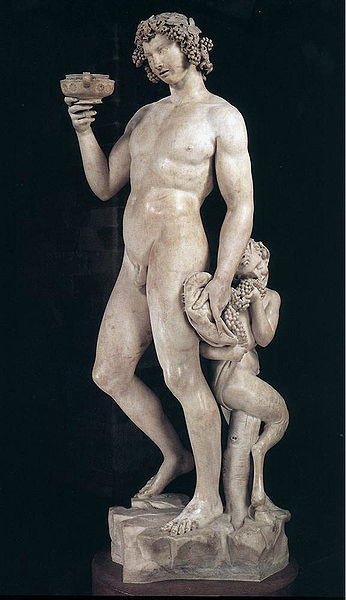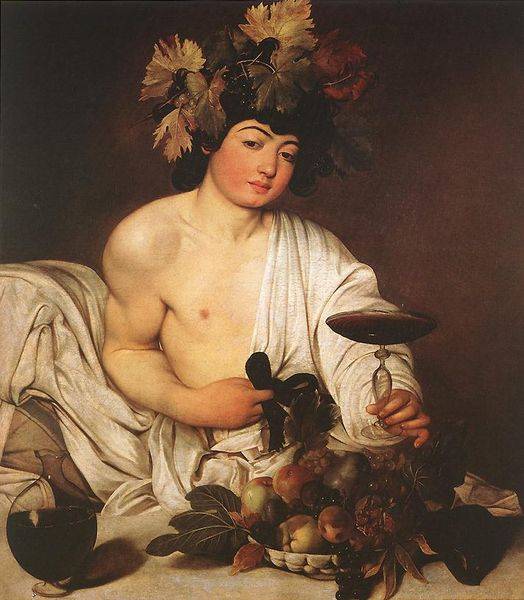Dionysos
Plus Pan, Echo,and Narcissus
BACCHUS - Michaelangelo

THE BIRTH, CHILDHOOD, AND ORIGINS OF DIONYSOS
Dionysos’s mother was SEMELE, princess of Thebes, who had an affair with Zeus. Hera was jealous and decided to destroy Semele. Hera visits Semele disguised as her old nanny. Hera suggests that Semele’s lover is simply a man claiming to be Zeus. She suggests that Semele should induce him to promise to do whatever she asks, then ask to see him as he appears to Hera.
Semele follows Hera’s advice, Zeus reveals his true for to her, and Semele is incinerated. Zeus snatches the infant Dionysos from Semele’s womb and implants’ him in his own thigh. Dionysos is later born from Zeus’s thigh, thus receiving his epithet “twice-born.” Dionysos apparently gains his immortal status from his incubation in Zeus’s body.
As a divine child, Dionysos was brought up by nymphs and by Semele’s sister Ino on a mountain named Nysa, variously located. Dionysos came to Greece from Phrygia and Thrace..
BACCHUS - CARAVAGGIO

HERMAPHRODITUS AND SALMACIS
As a result of an affair between Hermes and Aphrodite, a son was born, named HERMAPHRODITUS, whose name and beauty came from his parents. The most famous version of his story comes from Ovid, which not only gives an etiology for the hermaphrodite but also explains why the spring SALMACIS, was believed to enervate those who bathed in it.
Hermaphroditus was brought up in a mountain cave by nymphs, and when he was fifteen he left home to wander unknown lands. When he came to Halicarnassus, on the coast of Asia Minor, he discovered a lovely clear pool of water surrounded by fresh green grass. A nymph, Salmacis, inhabited the pool. She refused to hunt in the woods and follow the pursuits of Artemis, but instead remained at her pool, often languishing seductively on its verdant banks.
Once when she was picking flowers nearby, she caught sight of the divinely beautiful Hermaphroditus and was smitten with an irresistible desire to have him. She carefully made herself as attractive as possible before she addressed him with a fervent declaration of love that she insisted must be consummated.
The boy blushed because he did not know what love was, and when she touched his lovely neck and demanded at least the kisses of a sister, he threatened to leave. Salmacis, afraid to lose him, said that she would give him free access to the place and pretended to leave him all alone. Instead she hid behind a nearby grove of bushes to watch.
Hermaphroditus, captivated by the pool, threw off his clothes, and Salamacis was overwhelmed by the sight of his naked body. He dove into the water, and Salmacis, inflamed by passion, quickly dove in after him. She grabbed hold of him and held him, enveloping him with kisses as he struggled to be free. Salmacis clung to Hermaphroditus with her whole body, and it was as though they were one. The gods granted her prayer that they never be separated. Their two bodies were joined together, and they no longer were boy or girl but partook of both sexes.
The parents of Hermaphroditus, now a hermaphrodite, granted his prayer that any man who bathed in this pool would emerge with limbs weakened and softened and but half a man.
http://www.oup.com/us/companion.websites/9780195397703/student/materials/chapter12/?view=usa
Genesis - Fountain of Salmacis, 1971
Why is Dionysos not given as much credence as other Greek gods?
Evidence now shows that Dionysos was worshiped in Greece as early as most of the other Olympic gods; he is not a late arrival.
The question of why Dionysos is so different and why he is represented in myth as a latecomer to the pantheon are left open.
-Some scholars think that the representation of Dionysos as a latecomer reflects the Greeks' own discomfort with and distrust of irrationality and frenzy.
-Another possibility is that Dionysos's association with young, verdant, growing things carries over into his myths as the ideas that he himself is young, i.e., recent.
-No definitive answer exists.
Classical Mythology -Elizabeth Vandiver